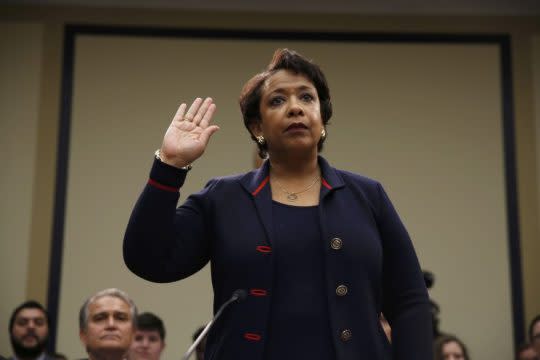AG Lynch rebuffs House GOP attempts to grill her over Hillary Clinton email probe
Attorney General Loretta Lynch took a decidedly different tack than FBI Director James Comey, repeatedly rebuffing House Republicans’ Tuesday efforts to grill her about details of the probe into Hillary Clinton’s emails.
While Comey “has chosen” to talk about the bureau’s findings in the politically charged case, Lynch told the House Judiciary Committee that it would not be “appropriate” for her to say anything further — other than that she had accepted the “unanimous” recommendation of “career prosecutors” and FBI agents that the former secretary of state not be criminally prosecuted for mishandling classified information.
If committee members wanted more information, she said on multiple occasions, she would “refer” them to Comey. “As attorney general, I am not able to provide any further comment on the facts or the substance of the investigation,” Lynch said.
Lynch never quite explained why she did not believe it was “appropriate” for her to talk about the closed case, which did not involve testimony before a grand jury that by law must be kept secret. And her stance clearly frustrated Republicans who had hoped to use the occasion — a routine oversight hearing — as an opportunity to hammer the attorney general over a decision that they contend shows there had been a “double standard” of justice when it came to the presumptive Democratic Party nominee.
“Your refusal to answer questions regarding one of the most important investigations of someone who seeks to serve in the highest office of this land is an abdication of your responsibility,” said Rep. Robert Goodlatte, R-Va., who chairs the panel. “This is a very important issue of whether or not the Justice Department is going to uphold the rule of law in this country.”
Other GOP members slammed Lynch for meeting with former President Bill Clinton aboard her airplane in Phoenix while the matter was still pending. She previously said it was an unplanned encounter and apologized. “Your actions contributed to this belief that the system is rigged,” said Rep. Jim Jordan, R-Ohio. “You made a bad situation worse.”
Lynch, seemingly unruffled, told Jordan she never discussed the email probe with Clinton during the airplane meeting and there was no talk about her serving in a future Hillary Clinton administration. But she said that, in order to avoid any misperceptions, she had publicly announced ahead of time that she would accept the findings of her “team” — a step she acknowledged she had never taken before.

If it yielded no new facts about the email probe, the Tuesday hearing demonstrated anew that Republicans have no plans to drop the issue. The same day, Goodlatte and Rep. Jason Chaffetz, chairman of the House Oversight and Government Reform Committee, fired off a letter to the U.S. attorney for the District of Columbia asking that he open up a new probe into whether Clinton had committed perjury or made false statements about her emails in testimony before Congress. Goodlatte and more than 200 other House Republicans signed a letter to Comey challenging his contention that Clinton could not be prosecuted under a federal statute that makes it a crime for a federal official to mishandle — through “gross negligence” — classified information.
They cited, as their prime example, a 1989 case of a Marine sergeant who was charged and jailed (for 10 months) for mistakenly throwing classified documents into his gym bag when he was clearing out his desk at Marine headquarters in Washington, even though there was no evidence that the sensitive material ever ended up in the hands of a third party.
But even that case, involving Marine Sgt. Rickie L. Roller, had aggravating factors that would not seem to apply to Clinton’s case. Roller later discovered that he had taken the classified documents home and, fearing a reprimand, had hidden them in his garage and planned to destroy them.
While Comey last week lambasted Clinton for being “extremely careless” in using a private email server to send and receive classified information, he said “no responsible prosecutor” would bring a case because there was no evidence of an intent to violate the law.
Democrats at the hearing portrayed the Republican line of attack as a waste of time, especially given the turmoil in recent days over police shootings of African-Americans in Baton Rouge and Minnesota and the slaying of five police officers in Dallas.
His GOP colleagues were “going after rabbit holes,” said Rep. Hank Johnson, D-Ga. “This is really a spectacle.”


